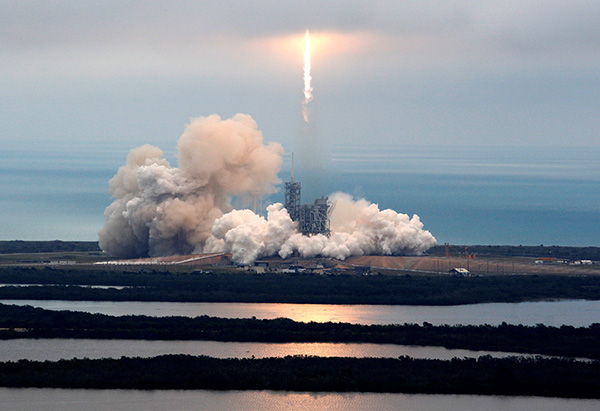SpaceX launches rocket from historic NASA pad
By Agencies in Cape Canaveral, Florida (China Daily) Updated: 2017-02-21 07:31A SpaceX Falcon rocket blasted off on Sunday from a Florida launchpad once used to send NASA astronauts to the moon, a step forward for billionaire entrepreneur Elon Musk and his company's goal of ferrying astronauts to the International Space Station.
The 70-meter Falcon 9 soared off a seaside launchpad at the Kennedy Space Center at 9:39 am carrying a Dragon cargo ship that holds supplies and science experiments for the station.
The Falcon 9's first and second stage separated about 2.5 minutes into Sunday's launch. As the first stage flew back for its touchdown, the second stage continued to power Dragon to orbit.
Approximately 8 minutes after the initial liftoff, the California-based company successfully landed the first stage of its Falcon 9 rocket onto the ground.
"Baby came back," SpaceX founder and CEO Musk posted on Instagram, along with a photo of the rocket landing at LZ-1 on the Florida coast.
Right on schedule, the Dragon spacecraft, which is carrying about 2.5 metric tons of research equipment, cargo and supplies to the International Space Station, then separated from Falcon 9's second stage about 10 minutes after liftoff and achieved its preliminary orbit. The spacecraft's two solar arrays then completed deployment.
"Dragon is on its way to the International Space Station. Capture by @Space_Station crew set for early Wednesday morning," SpaceX then posted on Twitter.
The launch has been scheduled for Saturday but was called off after a problem with the upper stage of the rocket.
According to NASA, there was an issue with the "thrust vector control system" that developed late in Saturday's countdown.
SpaceX determined that the problem was with one of two thrust vector control actuators, which help steer the second-stage engine nozzle through flight.
They replaced the actuator on Saturday night and then ran tests on the pad before launch, according to SpaceX Dragon program manager Jessica Jensen.
NASA were closely monitoring Sunday's launch to learn more about the company's operations before it clears SpaceX to fly astronauts.
The liftoff marked a successful debut for SpaceX at Kennedy's Launch Complex 39A, originally built for the 1960s-era Apollo moon program and later repurposed for the space shuttles.
SpaceX plans to use the pad for commercial missions, as well as future manned flights.
The pad was last used for the final space shuttle launch in 2011. In 2014, SpaceX signed a 20-year lease and has spent millions on remodeling.
"It was really awesome to see 39A roar back to life," Jensen told reporters after the launch. "This is a huge deal for us."
It was also SpaceX's first launch from Florida since an accident in September caused heavy damage to what had been the company's prime site at Cape Canaveral Air Force Station, located just south of the NASA spaceport.
NASA hired SpaceX to fly cargo to the station after the shuttle program ended. SpaceX and Boeing Co are scheduled to begin flying crews to the station by the end of 2018, but a United States government report last week said technical hurdles likely will delay both companies.
Last month, SpaceX resumed flying its Falcon 9 rockets using a second launchpad in California, where the first stage of the rocket also succeeded in relanding.
The company plans to reuse the rockets to slash costs and reduce pricing.
SpaceX aims to have the Florida launchpad damaged in last year's explosion up and running by this summer.
|
 The SpaceX Falcon 9 rocket disappears into clouds after it lifted off at the Kennedy Space Center in Cape Canaveral, Florida.Joe Skipper / Reuters |
- 'Cooperation is complementary'
- Worldwide manhunt nets 50th fugitive
- China-Japan meet seeks cooperation
- Agency ensuring natural gas supply
- Global manhunt sees China catch its 50th fugitive
- Call for 'Red Boat Spirit' a noble goal, official says
- China 'open to world' of foreign talent
- Free trade studies agreed on as Li meets with Canadian PM Trudeau
- Emojis on austerity rules from top anti-graft authority go viral
- Xi: All aboard internet express











